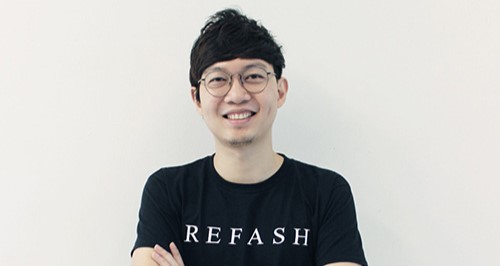
Ten years ago, as an SMU undergraduate, Aloysius Sng (BBM 2014) was already earning his stripes in the fashion industry. Between classes and group projects, Aloysius ran multiple businesses which supplied wholesale clothes to well-known blogshops, provided consignment services, and organised large-scale flea markets.
Today, the Lee Kong Chian School of Business alumnus and The Peak Power List 2018 awardee is the founder of Refash, an omni-channel portal which helps women buy and sell secondhand fashion. While Refash might seem like a natural extension of Aloysius’ foray into the fast fashion industry, it boasts a larger cause: to change mindsets against secondhand fashion, and encourage sustainable practices. As we sat down with Aloysius to find out more about his journey with Refash, it became clear that Aloysius was not only an entrepreneur: he was a change-maker.
A New Way to Buy and Sell Fashion
Refash first burst into Singapore’s fashion scene in 2016 with a unique preposition: bring us your pre-loved clothes, receive cash, and the Refash team will do the rest.
Customers familiar with Refash’s brand story knew that Aloysius was inspired by his observation of his wife (then girlfriend)'s wardrobe situation: despite a bursting closet, only 70% of the clothes were worn frequently. Many of the pieces, despite its excellent condition, ended up being discarded to make space for more shopping. To Aloysius, that was an unnecessary waste with larger consequences.
“The estimation that Semakau Landfill will run out of space by 2035 is no joke,” he told us. “The quality of fast fashion had advanced to a point where most clothes could endure up to 20 wears. Yet, many of the clothes in Singapore were worn no more than 3 times before being discarded. We send more than 40 million kilograms of clothes to the trash each year.”
Addressing the gap in the secondhand market, Aloysius remarked, “Whilst online platforms like Carousell allowed women to sell their clothes, it took time and effort to take a photo, upload it on the platform, and negotiate with buyers. Even then, there was no guarantee that sales would be made. Likewise, for flea markets, it cost money to rent a stall, bring the clothes to sell, and at the end of the day, it was likely there would still be leftover clothes to deal with. Refash cuts out all this manual processing for our customers, reducing the effort to clear their wardrobes, and therefore encourages people to contribute their clothes to us instead of throwing it away.”
With his keen understanding of consumers’ behaviour, Aloysius and his team had gown Refash into 8 stores in Singapore and 4 in Kuala Lumpur since its inception in 2016. However, Aloysius had set his sights on advancing the cause even further: to create the first rental service for fast fashion in Asia. Referring to his previous statement about the enduring quality of today’s clothing, Aloysius recognised that, even with Refash’s contributions, “most clothes only go through 2 – 3 owners before being discarded.”
“A rental service model would allow each piece of clothing to go through 5 – 8 owners before its utility is completely maximized. That is what I hope to see in the future, and Refash is taking the lead in it.”
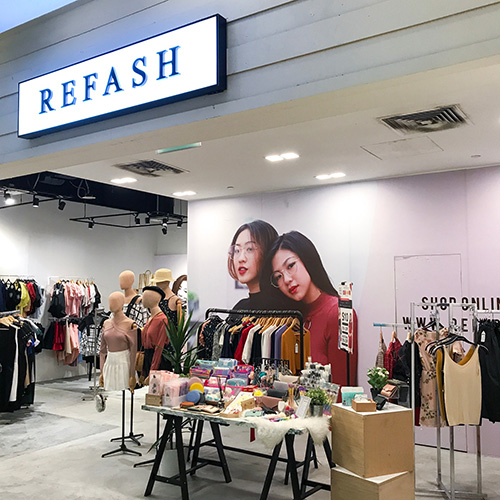
The storefront of Refash's Orchard Gateway outlet. There are currently 8 physical outlets in Singapore, of which the City Plaza outlet is wholly owned by Refash. All other outlets are opened as franchises, allowing aspiring business owners to manage its operations with support from Refash's headquarters.
More Than Just a Karung Guni
Despite Refash’s proven model, it was not a smooth journey for Aloysius and his team to arrive at its current state. For one, they had to overcome negative impressions that came with the mention of “secondhand”.
“Many people still have the stigma that ‘secondhand’ meant that it was of poor condition. That is, until they visit our stores. With our proper presentation, many of the customers were surprised that the pieces on sale were mostly ‘Like New’ – you could hardly tell that it had any previous owners before.”
Other than the challenge of changing perceptions, Aloysius also had to deal with naysayers, who looked down on his business model.
“During a pitch session for an accelerator programme, a senior executive actually remarked to me, in my face and in front of a large group of people: ‘You are just a glorified karung guni.’ I was very affected by it at that time.”
The incident prompted Aloysius to reflect upon the current state of the fashion industry, which culminated in an article on Tech In Asia.
“Many of the large players in fashion, such as H&M, would launch “Conscious” collections that give consumers the impression that their clothes were being recycled. How much of it was effective in recycling the textiles, and how much of it was just a marketing ploy for the sake of CSR? I found it so ironic that they would tout themselves to be advocating “sustainable fashion”, as they continue to churn out millions of new clothes to generate sales.”
“That reflection solidified my belief that Refash’s mission was so much more than just trading in secondhand fashion. Refash provided a solution to counter the textile waste epidemic that is happening around the world today. The larger the team grew, the more strongly I believed that what we were doing made a positive difference to society.”
With this greater mission articulated, Refash also turned to other areas of the community to combat this problem, collaborating with non-profit organisations such as The Salvation Army.
Refash has come a long way since the comparison to a rag-and-bone business – it eventually got accepted into the SPH Plug & Play Accelerator Programme and raised funding above $400,000. It now generates an annual revenue of $2 million in the Singapore market alone, based on trades of more than 1 million articles of clothes a year. This impressive feat was achieved within the span of two years.
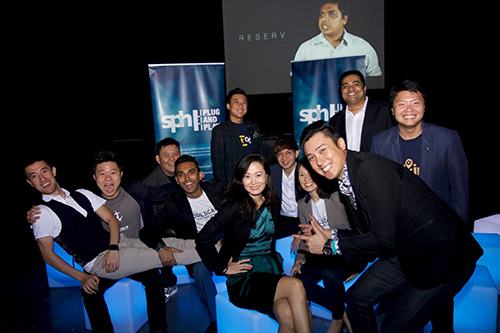
Aloysius (centre, with glasses) at the SPH Plug and Play Demo Day 2016. Also in this photo are fellow SMU alumni Ivan Chang (BBM 2014) of Wonderlabs (2nd from left) and Kendrick Wong (BAcc 2013) of Hapz (5th from left, standing). (Photo credit: SPH Plug and Play)
Despite the naysayers, there were also supporters who helped Aloysius in his businesses along the way. Aloysius credits many of the friends whom he met in SMU for helping him with their skills and talents.
“One of my school mates, Chen Xuan Zhong (BSc(ISM) 2014), helped to manage my technology team in Jogjokarta; on top of his full time job in a tech company. I also had the privilege of receiving advice from Lai Xin Chu (BSc(ISM) 2014) and Kendrick Wong (BAcc 2013), who are now the co-founders of Hapz – an e-ticketing platform which most recently serviced NDP. Kendrick was also the co-founder of my earlier businesses, Three Blind Mice.”
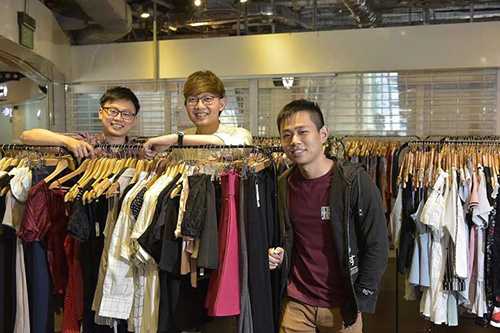
Aloysius (centre) with co-founders of Refash, Shawn Cheo (left) and Stephen Chong (right) at one of Refash's outlets. (Photo credit: The Straits Times)
The Original Muse
Of all the support which Aloysius had received along the way, the one who remained most important to him was his wife, See Toh Yuen Yee (BBM 2014) – whose wardrobe situation first inspired Aloysius to identify the gap in the market, leading to the birth of Refash. Turning to the mention of Yuen Yee, who also happened to be an SMU alumna, Aloysius’ demeanor visibly became tender:
“You really need someone who understands and supports your dreams, especially as an entrepreneur. Every entrepreneur knows that owning a business consumes time like nothing. Saturdays and Sundays are burnt. I mean, look at me; I just got released from reservist, and I am immediately back in office for this interview and for another meeting later on; I have not seen my wife in 6 days, but she understands this – for that, I am eternally grateful.”
Beyond that, his wife had also been a valuable source of insight. “My management team are all guys. She was able to provide very valuable insight from a woman’s perspective, which was crucial as our customer base was entirely female. She also contributed ideas we did not think would work at first: such as the initiative with The Salvation Army. I didn’t believe that we would have been able to get any clothes from them, or derive any sort of value; but when we embarked on it, I was so surprised. We could churn thousands of dollars from the clothes they gave us, which we then donate back to them. The feeling of giving back was a personal satisfaction, which was very different from earning revenue. It helped that we could generate such good brand value from it.”
“I am really happy that I have met her,” he smiled.

Aloysius and his wife, Yuen Yee, on their wedding day. Besides being graduates of SMU, the couple were also from the same secondary school.
Advice to SMU Juniors
“Fashion is a tough industry. I see Refash as more of a peer-to-peer marketplace; where people exchange clothes with each other. It might sound cliché, but you must have a passion if you want to run your own business. At the end of the day, execution is also a very important word. If you dream of something, you must always take the first step, which will then lead to a bigger piece. Without the first step, your dream will only stay on paper.
Another thing I have learned through building Refash is about leading a team. Big achievements always require team effort. There is an old adage I subscribe to: “If you want to go fast, go alone; If you want to go far, go as a team”. The current team I have had been with me since the very beginning: many of them started from interns, and upon graduation we will convert them to full time staff.
I had experience hiring fresh graduates before; however, the candidates we hired came in with ideals of what a start-up should be: big offices, great benefits, etc. They left after 5 – 6 months. If you intend to work in a start-up, you must be prepared to work hard to achieve a mission together; and not just expect perks and recognition.
“I believe in my people, in trusting them, and working together to achieve Refash’s goals.”
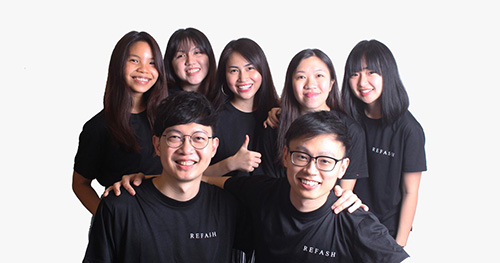
Aloysius with some of the members of his Refash team (Photo credit: Refash.sg)
What’s Next
“I hope to continue expanding to other Southeast Asian markets, such as Penang, Johor Bahru, and Manila. We are also exploring collaborations to enhance our technology, and really bring Refash over the tipping point. As long as an initiative could help Refash to grow, to get bigger, I would support it. The longer we are in the market, the better we could position ourselves as the main player in sustainable fashion, and grow our network of buyers and sellers who subscribe to the same beliefs.”
Refresh your wardrobe by selling your new items or purchasing "Like New" items from Refash.sg today!